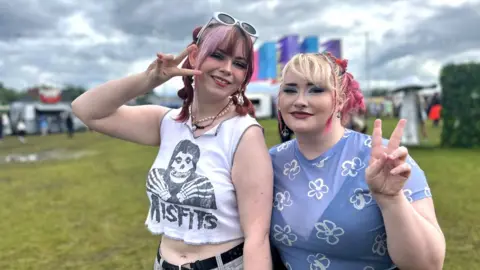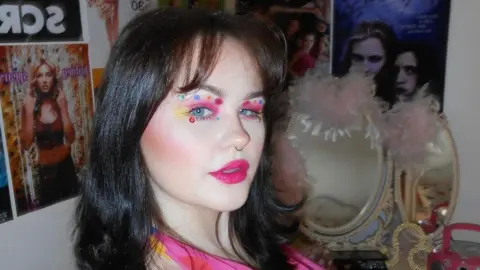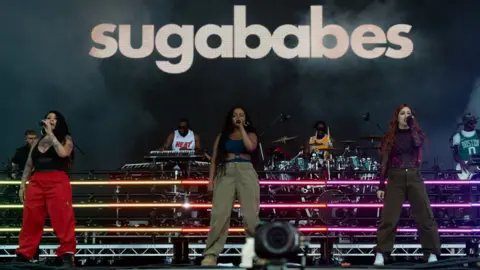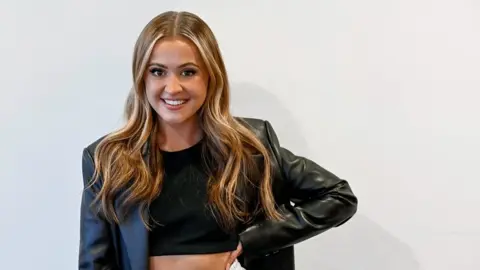Why the 90s and noughties are having such a moment
 BBC
BBCAqua's Barbie Girl is back on the radio, the Sugababes are packing out festival tents and low-rise jeans are here to stay.
Whether it's on your radio, in the shops or at your cinema, you can't escape it.
We're talking, of course, about the influence of the 90s and 00s.
But what's the fascination with those decades?
For friends Emily and Yasi it's a love of everything, from fashion to design and music. They're both 20 and grew up with 90s music around the house.
"I'd say it was the best era of music," says Emily.
It's not just original hits that Emily loves, but recent collaborations between artists like JoJo and Mahalia and Aitch and Ashanti.
"I really like that some celebrities feature older songs and bring them to a new generation. I think that's really cool," she says.
Emily and Yasi are dressed for the occasion when they speak to BBC Newsbeat at Manchester's 90s Baby Festival.
Yasi says it's not uncommon for her to spend hours looking at pictures of 90s and noughties celebrities to get fashion inspiration.
"It was iconic, the outfits never go out of date," she says.
"No matter where celebrities went, their outfits were always eye-catching so it's something we can all embrace."
 Ellie Addis
Ellie AddisEllie Addis agrees. She's a fashion blogger from Kent, who's made a career out of styling clothes from the era.
She's talking to us over Zoom from her bedroom, which is fittingly plastered in 90s pop culture posters.
The 22-year-old jokes: "It's my childhood dream fulfilled as an adult."
For her, the 90s symbolise happier times and childhood, even though she was born in 2000, or Y2K, as it was known back then.
"I love that era of fashion because it's like reminiscing on being a kid again when things were simpler."
Ellie's TikToks get thousands of likes and she's built up a following of over 500,000 followers who love her TV-inspired content.
"I base a lot of looks on programmes. I love 90s shows and with so many streaming services bringing shows and films back they're allowing younger audiences to discover them for the first time."
Her main muse? That's easy.
"Buffy the Vampire Slayer. Every single episode I watch and think 'I would wear that outfit' and those episodes aired 25-odd years ago."
 Getty Images
Getty ImagesNostalgia is something DJ and presenter Nat O'Leary has noticed when it comes to our love of the era.
She hosts the Radio 1 00s show, a programme that - as the name suggests - is dedicated to noughties music.
Each week the reaction from listeners is huge.
"When a song plays, especially from the 90s and noughties, it takes you back to a moment where we didn't have social media," she says.
"We'll play All Saints and somebody will message in and say, 'I remember having my first kiss to this', or another song will remind them of their first rave."
She agrees with Emily's love of modern remixes and collabs, and says it's no surprise current artists are going back to that time.
"It was the best era of music, there was so much range and expression," she says.
"Everybody tried and did different things and nobody followed a form of fashion.
"I think that influence is partly down to freedom of judgement from social media."

Clay Routledge is a psychologist specialising in nostalgia. He thinks our love of the era is about our changing relationship with technology.
"The 90s were the last period where the internet was more of a fun toy that we used to find music and videos," he says.
"Now, we're always online and we're also on the cusp of a potential revolution in artificial intelligence and there's a lot of anxiety about how it's going to affect our lives.
"Reminiscing about the 90s and 00s is comforting because it gives us connection to times in our lives where we felt more free, adventurous and connected to other people".
Many fans of the 90s, like fashion blogger Ellie, weren't around then - so why is it nostalgic to her?
According to Clay, it's "cultural continuity".
"It's about wanting to be anchored in something deeper and more enduring than ourselves," he says.
"It's not a conscious thing. I don't think people are walking in the shops thinking 'what did my parents wear?'."
"It's an unconscious level of looking to feel connected to the story of our culture."


